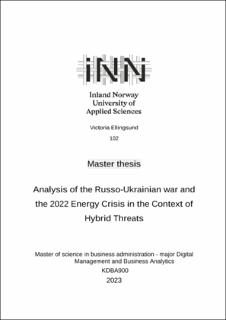| dc.contributor.advisor | | |
| dc.contributor.author | Ellingsund, Victoria | |
| dc.date.accessioned | 2023-10-25T16:10:34Z | |
| dc.date.available | 2023-10-25T16:10:34Z | |
| dc.date.issued | 2023 | |
| dc.identifier | no.inn:inspera:144978637:147268774 | |
| dc.identifier.uri | https://hdl.handle.net/11250/3098748 | |
| dc.description.abstract | Etter å ha sammenlignet priser på TTF naturgass og den geopolitiske risikoindeksen (GPR) hevder denne oppgaven at prisene på naturgass var påvirket av den geopolitiske situasjonen i Europa i 2021 og 2022. Ved å vise hvordan bevegelsene til gassprisene ble påvirket av GPR – av krigen og hybride trusler fra Russland, undersøker denne oppgaven om manipulasjon av eksport av naturgass fra Russland sin side forårsaket energikrisen i Europa i 2022.
Utgangspunktet for denne oppgaven var observasjonen av at hybride trusler blir mer vanlig og at ettersom mange stater befinner seg i avhengighetsforhold med sine energileverandører så er de i en utsatt posisjon der energi kan brukes som pressmiddel for å oppnå sikkerhetspolitiske mål. Den Russiske invasjonen av Ukraina og den påfølgende energikrisen i Europa bød på en mulighet til å studere slike hendelser i lys av hybrid krigføring.
Tidsserier av priser på naturgass og GPR analyseres ved hjelp av volatilitetsanalyse og wavelet analyse. Gassprisene undersøkes for volatilitet og klynger av volatilitet ved hjelp av GARCH modeller. GPR og gasspriser sjekkes for korrelasjon og sambevegelse ved hjelp av wavelet analyser.
Et viktig funn i denne studien er at gasspriser og GPR beveger seg sammen på de samme frekvensene, noe som indikerer kovarians og korrelasjon, og at de to tidsseriene beveger seg i samme fase fra begynnelsen av 2021 til slutten 2022. Høye gasspriser og høy volatilitet knyttes til krigen i Ukraina og spenninger i Europa som er relatert til krigen, gjennom GPR indeksen. Disse funnene diskuteres i lys av omstendighetene som førte til krigen i Ukraina og i lys av hybrid krigføring.
Denne studien finner at ettersom Russland tidligere har benyttet seg av hybride virkemidler i andre konflikter, og mest sannsynlig vil gjøre det igjen, så er det rimelig å anta at de Russiske handlingene som førte til energikrisen var et resultat av forsøk på hybrid krigføring. | |
| dc.description.abstract | By analyzing TTF natural gas prices together with the geopolitical risk (GPR) index, this thesis claims that the prices of natural gas were influenced by the geopolitical risk in Europe in 2021 and 2022. By showing how movements of natural gas prices were affected by the GPR - essentially the war and hybrid threats posed by Russia, the thesis seeks to investigate whether the Russian manipulation of its natural gas exports to Europe ultimately caused the 2022 European energy crisis.
The starting point for this thesis was an observation that as hybrid threats are becoming increasingly common, energy is the perfect tool to exert pressure on state actors as many states are in a relationship with energy suppliers that make them vulnerable to manipulation and extortion. The occurrence of the Russian invasion of Ukraine and the following energy crisis in Europe posed an opportunity to study the events in the context of hybrid warfare.
Time series of natural gas prices and GPR are statistically analyzed through volatility analysis and wavelet transform analysis. Gas prices are checked for volatility and volatility clustering using the GARCH model framework. GPR and gas prices are checked for cross-correlation and co-movement through wavelet transform analysis.
A key finding is that gas prices and GPR move together at the same frequencies indicating that there is covariance, coherence, and that the two time-series move in phase from the beginning of 2021 to the end of 2022. High gas prices and high volatility in the prices are linked to the war in Ukraine and tensions in Europe related to the war, through the GPR index. These findings are discussed together with the pretext of the war in Ukraine and the workings of hybrid warfare.
The study finds that as Russia has incorporated a number of hybrid tactics and strategies in earlier disputes and conflicts, it is more than likely to apply such techniques again and it is reasonable to assume that the energy crisis was result of attempts of hybrid warfare. | |
| dc.language | eng | |
| dc.publisher | Inland Norway University | |
| dc.title | Analysis of the Russo-Ukrainian war and the 2022 Energy Crisis in the Context of Hybrid Threats. | |
| dc.type | Master thesis | |
